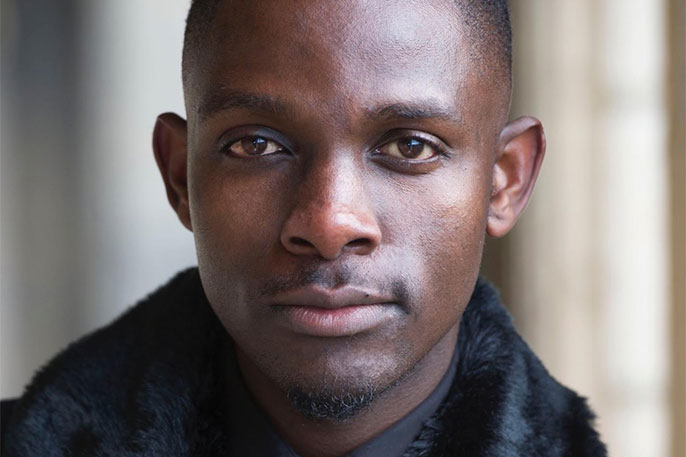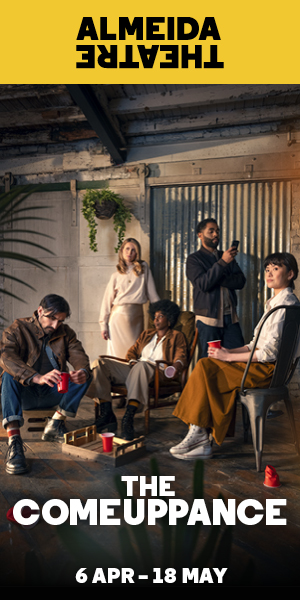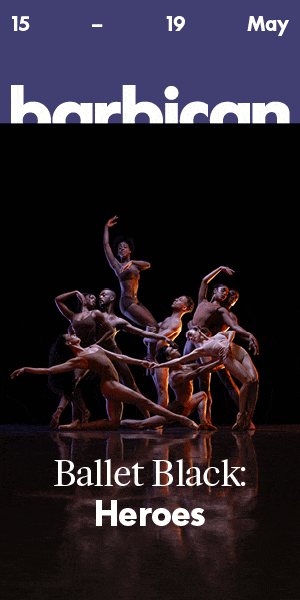John Pfumojena – interview
Tangle Theatre’s Workshop Negative by Cont Mhlanga, Gate Theatre
Proud Zimbabwean actor, John Pfumojena is making history by bringing outlawed play Workshop Negative (see listing) to the UK for the first time. Cont Mhlanga’s response to Zimbabwean independence was banned in 1986 for its overt criticism of Robert Mugabe’s government. Most copies of the play were destroyed and the piece has not been performed since. Until now. In 2011, Tangle’s artistic director Anna Coombs set herself a mission to bring Mhlanga’s infamous play to London. Days after the EU referendum, Workshop Negative will be performed at London’s Gate Theatre and Pfumojena believes it could not come at a more relevant time.
I think everyone will relate to Workshop Negative, especially right now; if you are British, especially if you voted. But more importantly, if you are human you need to come and watch this show.
“It’s a world story. Following independence, Mugabe’s government gained absolute rule and increased the divide between races. The histories easily could be reversed and it could be set in Europe. It has the relationship between the settled migrants and the past generation. In this play we look at the Rhodesians of the colonial era and the settlers. But in the UK, you could apply this to say Jamaican settlers in the UK and their offspring. It’s got the tension of racial disparity.”
I think everyone will relate to Workshop Negative, especially right now; if you are British, especially if you voted. But more importantly, if you are human you need to come and watch this show.
Pfumojena’s commentary on generational identity is incredibly auspicious. Since 52 per cent of the UK electorate voted Brexit, the subject of national identity has never been more prominent. Especially as many of the UK’s 3 million Europe born residents have started families here. With Britain now out of the EU, stark lines between British and foreign-born residents have been drawn.
Pfumojena describes how following Zimbabwe’s Land Reform, the black native and white settler population became further polarised: “Legitimacy and nationality are subjects we deal with a lot. There’s a couple of lines in the play where Ray (played by Danilo Atonelli) who’s the white Zimbabwean, says ‘Am I not equal to you? Can I not be equal to you simply because I’m white? I’m Zimbabwean and I was born here, but just because of what my ancestors did, I have to pay for that?’ That is one of the really strong issues that runs throughout the play, and can be flipped between the races – the sense of rights and equality”.
Mhlanga’s play is a three hander, with one black and one white worker being employed by a black socialist MP. This dynamic represents each key faction of post-independence Zimbabwe, in terms of race, class and political stance. Pfumojena plays worker, Zulu, a former soldier in the civil war against white rule. The actor and musician describes his character as: “a hard-core trained guerrilla fighter who wants equality for himself. He’s experienced a lot and he feels strongly about colonial rule, and was part of the struggle that toppled the white regime. He wants his identity to be pushed forward more, to feel that he’s got what he fought for.”
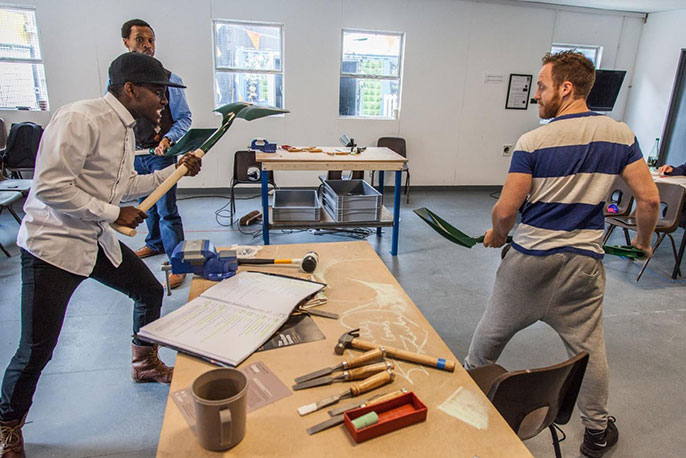
Having been born in Masvingo in 1989, Pfumojena has experienced the effects of post-colonialism first hand. Most significantly, the artist shares that the society presented in this 30-year-old work, differs little from Zimbabwe today.
When asked if he has encountered anyone similar to his character, Pfumojena answers diplomatically: “Of course I’m not at liberty to say. But when I read the script and approached the character of Zulu, about a dozen faces, one or two are close friends, popped into my head. But the other two characters are familiar too. The thing about Zimbabweans is that we are naturally pacifists, which is why there has not been a civil war in the 30 years under Mugabe. We are bubbly people who are all for moving forward. So in Workshop Negative, these are simple characters in a complex situation.”
Cont Mhlanga is such an incredible writer and I am so excited to be performing his work in London.”
I find Pfumojena articulate and deeply patriotic. He is eager to share the reality of life in Zimbabwe, revealing that the unemployment rate exceeds 80%. He candidly describes the poverty experienced by most families and the lack of resources, with most citizens having to travel to South Africa to buy food. But whilst Pfumojena is dedicated to bringing Zimbabwe’s struggles to public attention, he is emphatic that Zimbabwean people have a strength of character and resilience which will help them move forward. The award winning mbira player believes that artistic expression will be essential in Zimbabwe’s move towards democracy.
Pfumojena elaborates: “Theatre and music in Zimbabwe has never been fundamentally formed as an entertainment. They have been part of our way of life; a way of instruction, for ceremonies, for rain making, for speaking to the ancestors. This is the reason why companies like Amakhosi Theatre make such amazing shows, exposing aspects of the Mbire culture, the Shona culture. Bringing in aspects of our music, dance, dress and tradition. It is a very natural thing for us to produce drama which addresses issues and this is part of the transition to making a bigger Zimbabwe.”
Although it has been three decades since Workshop Negative was banned in Zimbabwe, it seems the iron fist of censorship is as unyielding as ever. Pfumojena experienced this in 2012 when appearing in Stanley Makuwe’s The Coup: “The play was a farcical fantasy critiquing Zimbabwe’s terrible health system. In a hospital, bodies rose from the dead and marched to the president’s mansion to demand answers and decent burial. These are the situations that are present in Zimbabwe. We presented the play in Harare, and we were meant to go on to tour around a hundred shows, but it was blocked. It’s the kind of thing that happens in Zimbabwe, it’s impossible to even be a concerned citizen.”
Luckily Makuwe was not arrested for his play, unlike Mhlanga who was imprisoned and threatened with hand amputation. Such was the policy on any criticism of Mugabe’s regime, making showing the play in Zimbabwe impossible.
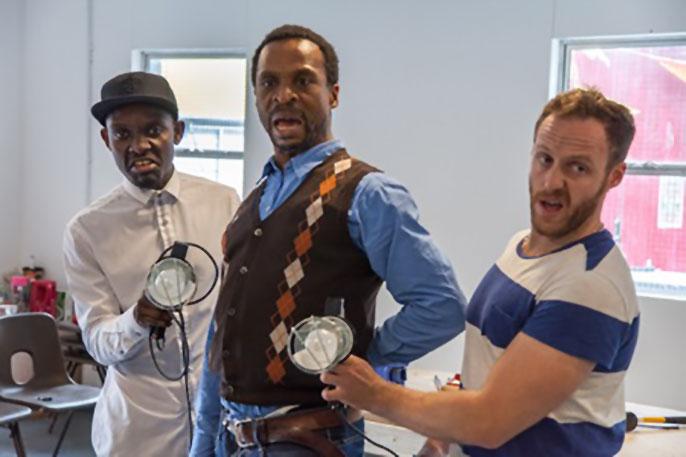
Director Anna Coombs was determined to bring the play to a UK audience, commenting: “Cont for me is one of the most exceptional playwrights in the world. His understanding of human nature and his understanding of society is completely profound. I’m a great believer as a director that to be truly universal, the best thing you can do is make a very local play. And if you want to be truly local in the play that you write, you need to be very universal. All of Cont’s work shows the ability to do this.”
Such was Coombs’ belief in this play that she was prepared to go on a labyrinthine journey to track down a copy of the script. No small task as all available copies were destroyed after the play’s banning in 1986. Luckily, with the help of an academic from Leeds University, Coombs began to compile the clandestine script. She recalls: “Between us we managed to get a photocopy of most of the script. We couldn’t find a complete copy because it had been banned, so I contacted a Zimbabwean colleague who lives in Austria and he was able to photograph bits of the script that he had. Another colleague did the same, so over time we managed to put the play together using photographs and bits and pieces. Then I typed the play up and sent it to Cont and he added the final touches and finally the play was complete.”
Pfumojena shares Coomb’s enthusiasm for Mhlanga’s work, and explains that acting in Workshop Negative has increased his understanding of Zimbabwe’s political landscape: “It’s helped me understand what is going on now. What was happening when I left. When I read it, I almost forgot that this was written three years before I was born. What attracted me the most was how things can repeat themselves or can become so much more relevant throughout time. Cont is such an incredible writer and I am so excited to be performing his work in London.”
After 30 years silence and much dedication, Workshop Negative is finally back on the stage where it belongs. In the wake of Britain’s departure from the EU, Pfumojena believes that this play has a vital message for UK audiences, stating: “I think everyone will relate to it, especially right now; if you are British, especially if you voted. But more importantly, if you are human you need to come and watch this show.”
Info: Workshop Negative by Cont Mhlanga is a the Gate Theatre from 6 – 9 July 2016 | See listing | Book tickets |Read Afridiziak e-newsletter – Zimbabwe’s Most Talked About Show comes to London
























